Abe's qualification to be prime minister: 2.7 points (out of 5)
Achievement of 38 major items of policy: 1.8 points (out of 5)
On December 26, 2014 it will be two years since the second administration of Prime Minister Shinzo Abe took office. As part of its regular evaluation of government policy, The Genron NPO carried out a survey of the administration's performance over the last two years. This was the third survey of the administration. It took the form of a questionnaire sent to intellectuals and followed up previous surveys carried out in April and December last year for the first 100 days and first year in office.
The survey began by asking respondents about their overall evaluation of the prime minister and his administration.
Abe's Qualifications as Prime Minister Rated at 2.7 points out of 5
Abe's qualifications as prime minister were evaluated under the following eight categories: personality, leadership and political skills, insight/ability/qualification, basic ideas/objectives, policy direction, achievements, team and system building, and demonstrating ability/accountability. He received an average rating of 2.7 points out of a maximum possible 5.0, the same as for the first year survey carried out 12 months ago.
His rating has fallen considerably from his rating after 100 days of 3.3 points but, in comparison with past administrations, this is still a good rating. Although he maintained a high rating of 3.0 points for his leadership and political skills, his score for achievements declined from 2.8 to 2.5 points.
38 items of Policy Agenda Rated as 1.8 points out of 5
On the other hand, when the respondents were asked to assess the administration's success in achieving 38 items of policy agenda, the average rating was 1.8 out of a maximum possible 5.0, with 5 points awarded for items where 'the government has performed well', 3 points for 'the government has performed poorly but is likely to well from now' and 1 point for 'the government has not performed well or it is unlikely to do so'. This rating was unchanged from the first year survey carried out 12 months ago.
The most favorable rating (2.8 points) was for the prime minister's leadership and command on decision making. The respondents' evaluation of the administration's performance handling Japan-China relations and its strategy to prevent incidents around the Senkaku Islands also improved.
Conversely, the most unfavorable rating (1.2 points) was for reducing the number of Diet members and the three most significant falls since the last survey were for the approach to achieve 2% inflation, the US-Japan Alliance and the relocation of the US Marines Air Corps Station in Futenma.
Approximately Half do Not Support the Abe Administration, Expectations have fallen
In the first survey, when respondents were asked if they still supported the administration after 100 days, the percentage of favorable responses was over 50% but this percentage has declined in both subsequent surveys (for the first and second years). There is also a contrast with the equivalent percentage of unfavorable responses which were 23.3% after 100 days, 43% after one year and now approach 50%.
Moreover, when asked to compare the administration's performance against expectations when it took office, the percentage of respondents who felt that performance was either below expectations or did not have any expectations from the start, was over 60%. This is more than a two-fold increase on the percentage after the first 100 days of 27.1%.
Conversely, the percentage of respondents who felt the administration's performance exceeded expectations has halved with each survey, and is now just above 10%.
The survey continued by asking respondents for their evaluation of the administration's handling of major policy issues.
Outlook for Abenomics is Pessimistic, the Goals for Fiscal Reconstruction Cannot be Achieved
Over 50% of respondents had a pessimistic view of Abenomics, the economic program the administration has pursued since it took office.
They were also divided as to whether postponing the consumption tax hike to 10% would have a positive impact or a negative impact on the success of Abenomics, with just under 30% in each camp.
On the other hand, almost 60% of respondents thought the administration would not achieve its primary balance target (a fiscal surplus excluding interest payments on debt) by 2020. Here the view that postponing the consumption tax hike would have an adverse influence on the economy emerged among respondents.
Over 40% want the Relocation of the Futenma Airbase Reexamined.
When asked for their opinion on the relocation of the Futenma air base, in the light of the election for the Governor of Okinawa, the response that reflected the result of the election (Based on the opinion expressed by the people, the plan to relocate to Henoko should be reviewed again, current arrangements should be renegotiated with the US government and a new direction sought.) and the response that sought fundamental reform of Japan's strategy towards National Security (It is unreasonable for Okinawa, which occupies 0.6% of Japan's total land area to host 74% of US forces in Japan. The burden should be shared across the country.) were both selected by 20% of respondents. If these two are combined then the number of respondents who see the Okinawa bases as an issue exceeds 40%.
Nearly Half Consider that Execution of the Right to Collective Self-defense Requires a Constitutional Amendment
Although a succession of previous cabinets felt it was outside their constitutional remit, the Abe administration decided that it was within the cabinet's power to reinterpret the constitution to give the government of the day the right to exercise collective self-defense and, accordingly, they formally recognized this right at cabinet level. When the respondents were asked if they approved of this course of action, nearly 50% replied that it was not a decision that could be made by reinterpretation of the constitution, it was a constitutional amendment that should be approved by the people. The respondents are taking an increasingly unfavorable view of the government's approach to legislative process.
The final questions were about the upcoming election.
Over 60% Disapprove of the Dissolution of Parliament, Over Half think the Administration should Explain its Political Attitude and Political Methods
First, when asked about the decision to dissolve parliament, over 60% of respondents disapproved.
Next, when asked on what areas the Abe administration should be called to account, the most popular response was the government's political attitude and political methods. Here we can hear the respondents' disapproval of the prime minster's decision to dissolve parliament. The percentage of respondents who thought the administration should address the merits of postponing the consumption tax hike, the issue on which the prime minister has gone to the people, was little more than 10%.
At the Election all Parties should Explain their Policies on Fiscal Reconstruction and Social Security
When the experts were asked what all political parties were obliged to explain, two responses were selected by over 50% of respondents. These were (i) Is the existing system of Social Security for pensions, health and long-term care sustainable and, if not, what alternatives are available? and (ii) What practical path of fiscal reconstruction should be taken? At this election the respondents are looking to all political parties to explain firm policies without postponing important matters that affect Japan's future.
The Result of this Election: Long-term Stability of the Abe administration and Less Trust of Party Politics
In response to a question asking how this election will affect Japanese politics, the most common response was that there will be an increase in distrust of party politics. This was followed by the long-term stability of the Abe administration with each receiving approximately 30% of all responses.
With respect to the Abe administration's future prospects, the respondents seem to think it will continue for at most four years: The percentage that felt the administration would serve the full term, until the next election to the House of Representatives in 2018, was approximately 30% versus approximately 40% who felt the administration would not last the full term.
An increasingly harsh view of the current state of Japanese politics
The final question in the survey asked the experts for their view of the current state of Japanese politics. The most common response, with a percentage close to 40% was that we were in a period where the political parties do not provide choices for Japan's future; populism, fighting bureaucrats and pork barrel policies have become more important. The most popular response in the previous two surveys, that we were in a period where we are still groping for a new society, government and country, was the third most popular response. Our intellectual respondent are taking an increasingly harsh view of the current state of Japanese politics.
Prime Minister Abe's Qualifications as Prime Minister were Assessed under Eight Categories. He Received an Average Rating of 2.7 points. This was a High Rating but the Evaluation of his Achievements has Fallen.
Our respondents have been evaluating the cabinet chief's qualities as prime minister since our first evaluation of the first Abe administration in 2006. This has been done by awarding him up to a maximum of five points for each of the following categories: personality, leadership and political skills, insight/ability/qualification, basic ideas/objectives, policy direction, achievements, team and system building, and demonstrating ability/accountability.
Abe's overall average rating of 2.7 points is unchanged from that awarded last year, after the first year of this administration (the rating after his first 100 days was 3.3 points). The individual ratings have also not significantly changed. The biggest movement was for achievements which declined by 0.3 points from 2.8 to 2.5. The highest rating (3.0 points) was again for leadership and political skills (here the rating after his first 100 days was 3.6 points and the rating after one year was 3.1 points).
Even if we compare the lower ratings received after two years to those of the previous administrations after 100 days, we can see this administration has maintained a high rating.
Evaluation of Prime Minister Abe's qualifications as prime minister
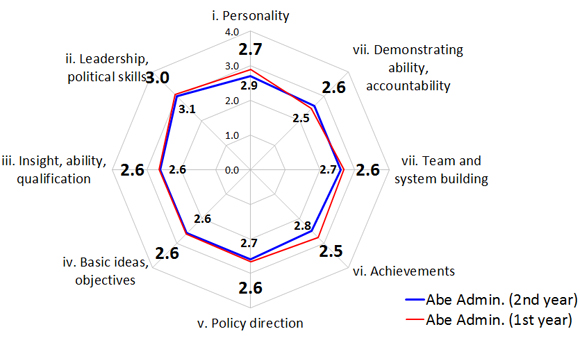
Evaluation of qualifications of previous prime ministers
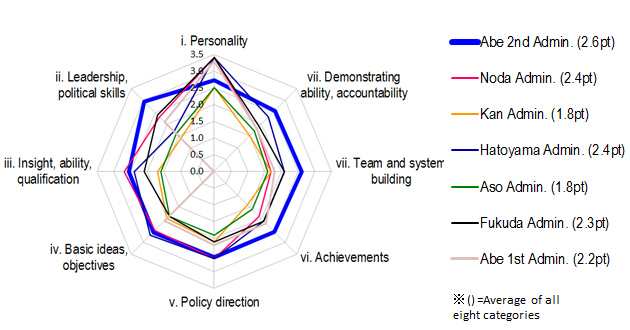
Our 301 Intellectual Respondents' Evaluation of the Abe Administration's Performance for 38 Major items of Policy after Two Years is Unchanged from Last Year at 1.8 points.
We asked our respondents to give their rating (out of a maximum of 5 points) of the administration's performance for 38 major items of policy agenda: 5 points were awarded for items where 'the government has performed well', 3 points for items where 'the government has performed poorly but is likely to perform well from now' and 1 point for items where 'the government has not performed well or is unlikely to do so'.
As a result, the administration was awarded an overall average (for all 38 items) of 1.8 points, the same as last year after one year in office. Although there was one item last year with a positive rating of 3 points or more (the prime minister's leadership and command in decision making), there were none this year.
If we compare these results to those after the first year, the two higher scores that stand out are for the administration's handling of Japan-China relations and its strategy to prevent incidents in the region of the Senkaku Islands. We can see that the administration was highly evaluated for being able to arrange a summit with the Chinese leader.
By contrast, the lowest rating (1.2 points) was for reducing the number of Diet members, which was agreed between Abe and Yoshihiko Noda of the DPJ (who were then respectively, President of the LDP and prime minister) when the Lower House of the Diet was dissolved in 2012. The other items receiving an average rating less than 1.5 points spanned a diverse collection of areas encompassing; measures to decommission the nuclear reactors and deal with contaminated water at Fukushima, measures to deal with the effect of greenhouse gases, fiscal reconstruction, reforms for a sustainable system of social security, education, decentralization of government to local jurisdictions, administrative reform of central government and constitutional revisions.
The three most significant falls since the last survey, each falling by 0.3 points, were for measures to achieve 2% price stability in collaboration with the Bank of Japan, the revival of the close US-Japan Alliance and the relocation of the US Marine Corps Air Station at Futenma.
Almost Half the Respondents Do Not Support the Abe Administration
When asked if they supported the current administration, 34.6% of respondents gave a favorable response. This percentage has fallen significantly from the percentage giving the same response after one year (41.4%) and follows the fall of more than ten points seen in the last survey, which covered a period that began after the first 100 days, when over half the respondents (53.1%) said they supported the administration.
By contrast, the percentage who did not support the administration after two years was 49.8% (after 100 days this was 23.2% and after one year 43.0%): This is approaching 50% and is the largest percentage to give this response during the past three surveys.
Q.Do you support the Abe Administration?
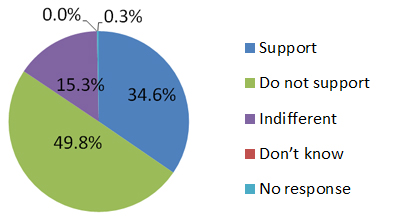
Expectations of the Abe Administration have Halved since One Year Ago
When asked to compare their expectations now to their expectations of the administration when it began, the most common response, that the respondents did not have high expectations from the start, was 34.9% (after 100 days this was 23.9% and after one year this was 34.9%). The next most common response, that the administration's performance was below expectations (25.9%), was over 10% higher than the percentage giving the same response after one year (14.8%; the response after 100 days was 3.2%). If we combine these two percentages (for 'below expectations' and 'did not have high expectations from the start') then 60% of our intellectual respondents have a favorable evaluation of the administration (the equivalent percentages after 100 days and one year were 27.1% and 49.7%).
On the other hand, the percentage of respondents for whom the administration's performance has been above expectations was only 11.0% (after 100 days this was 42.9% and after one year this was 20.8%). This percentage has halved with each survey. If this is combined with the number for whom the administration has performed as expected then the percentage of respondents with a favorable evaluation is only 34.6%. The trend in the percentage of favorable responses, which reached 64.8% after 100 days and was close to 50% after one year(47.6%), also shows that the respondents' expectations of the Abe administration have weakened with the passage of time.
What is your evaluation of the Abe administration's performance compared to your expectations when it took office?
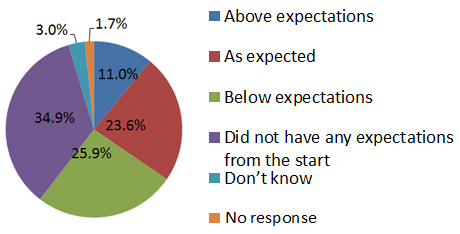
How did the intellectuals evaluate the core policy issues?
The Majority are Pessimistic about the Outlook for Abenomics
Only 7.3% of respondents felt that Abenomics, the economic program the administration has pursued for the last two years, was 'on track, success is in sight'. If we combine the percentage of respondents who felt the program was 'already failing, with no indication that effective counter measures are being taken' (18.3%), with the highest percentage who felt 'recovery is too dependent on unprecedented monetary easing and fiscal stimulus, the program is unlikely to succeed' (37.9%), then 56.2% of respondents are pessimistic about the outlook for Abenomics.
On the other hand 27.2% of respondents were of the opinion that Abenomics was 'beginning to show results but it was too early to forecast success'.
In November the prime minister announced that the consumption tax hike to 10% was being postponed until April 2017. When asked what impact this would have on the Abenomics program, the respondents were divided between those that thought it would have a positive impact (29.2%) vying with those that thought it would have a negative impact (28.6%). The number that thought it would have no impact on the program was 18.9%.
Q. What is the outlook for the Abenomics program at this point in time?
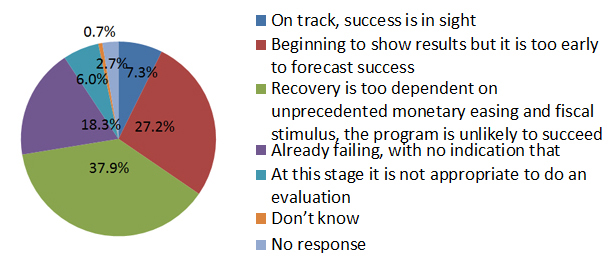
Q. What impact will postponing the consumption tax hike have on the Abenomics program?
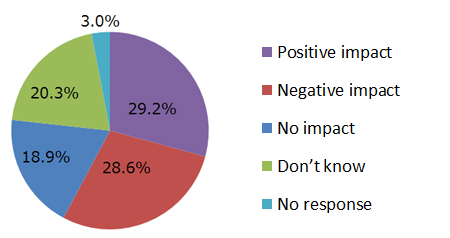
60% of Respondents Do Not Think Fiscal Reconstruction can be Achieved
When the prime minister announced the postponement of the consumption tax hike he also confirmed that he was still aiming for a surplus in the primary balance (a fiscal surplus excluding interest payments on debt) by fiscal year 2020. In this survey the percentage of respondents who did not think his administration could meet this target (59.1%) far exceeded the percentage who thought it could (59.1%). This majority will be waiting for a revised plan, to meet this objective, next summer with keen interest.
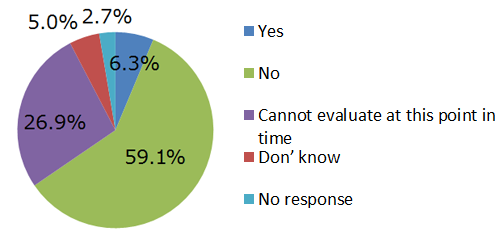
As a Result of the Election for Governor of Okinawa 46% Want the Relocation of Futenma Airbase to be Reexamined
As Takeshi Onaga, the former mayor of Naha and opponent of the relocation of the US airbase at Futenma to Henoko, was elected Governor of Okinawa on 16 November, we asked respondents for their view of the relocation. The largest group (37.5%) agreed with the statement that reflected government policy ('The recent election for Governor of Okinawa demonstrated popular opinion but the land reclamation at Henoko has already been approved at governor level. We should move on.').
Nevertheless, 22.3% agreed with the statement that reflected the result of the recent election ('Based on the opinion expressed by the people, the plan to relocate the US Marine Corps Air Station to Henoko should be reexamined. Current arrangements should be renegotiated with the US government and a new direction sought.') and 23.6% agreed with the statement that sought a fundamental revision of Japan's strategy for national security ('It is unreasonable for Okinawa, which occupies 0.6% of Japan's total land area, to host 74% of US forces in Japan. The burden should be shared across the country.'). If we take the total of these two responses together then 45.9% of respondents see the current circumstances surrounding the Okinawa bases as an issue.
Q. What is your view of the relocation of the US Marines Corps Air Station in Futenma in the light of the recent election for Governor of Okinawa?
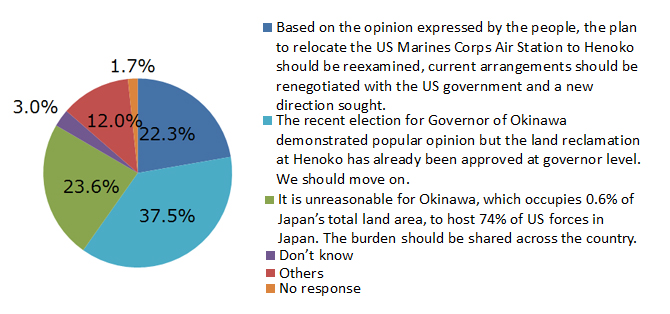
Half of intellectuals replied constitutional amendment needed for exercising collective self-defense, not as a reinterpretation of the constitution
Although a succession of previous cabinets felt it was outside their constitutional remit, the Abe administration decided that it was within the cabinet's power to reinterpret the constitution to give the government of the day the right to exercise collective self-defense and, accordingly, they formally recognized this right at cabinet level. When the respondents were asked if they approved of this course of action, nearly half (49.2%) replied that 'the matter should have been treated as a constitutional amendment, subject to the people's approval, and not as a reinterpretation of the constitution'. The percentage that agreed with the administration's process ('There is no issue even though the right was established by a reinterpretation of the constitution.') was limited to 24.3%. The percentage that saw the process as irrelevant because they would oppose any exercise of the right to collective self-defense was 21.6%.
Q. Was the correct constitutional process followed to establish the right to collective self-defense?
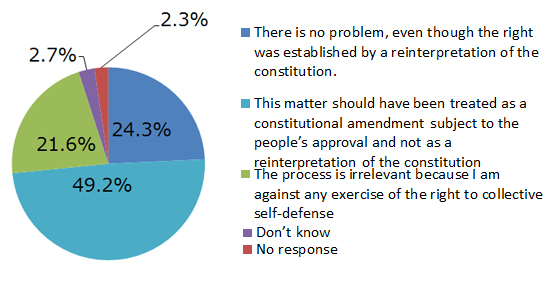
The questionnaire sent forms or e-mails in a period of a week from Nov. 24 to Dec. 1, 2014 to approximately 6,700 intellectuals in various fields who cooperate in Genron NPO activities, including experts, journalists, entrepreneurs and government bureaucrats.
An analysis was made of replies received from 301 of them. Of the respondents, males accounted for 86.0 percent and females 12.0 percent. By age category, 0.0 percent of them were teenagers while 4.0 percent were in their 20s, 6.6 percent in their 30s, 13.0 percent in their 40s, 22.6 percent in their 50s, 31.9 percent in their 60s, 18.3 percent were in their 70s and 1.7 percent were 80 or older. (The total does not equal 100 percent because some respondents gave no answers to certain questions. The same goes hereafter.)
By occupation, entrepreneurs and senior business people accounted for 14.3 percent, company employees 10.6 percent, senior officials in the media 3.0 percent, media people 12.6 percent, national government officials 2.7 percent, local government officials 2.7 percent, Diet members 0.0 percent, local assembly members 0.3 percent, NPO and NGO officials 11.0 percent, academics and researchers 9.0 percent, people working with various organizations 7.0 percent, students 2.3 percent, self-employed people 5.0 percent and others 17.9 percent.
Post a comment